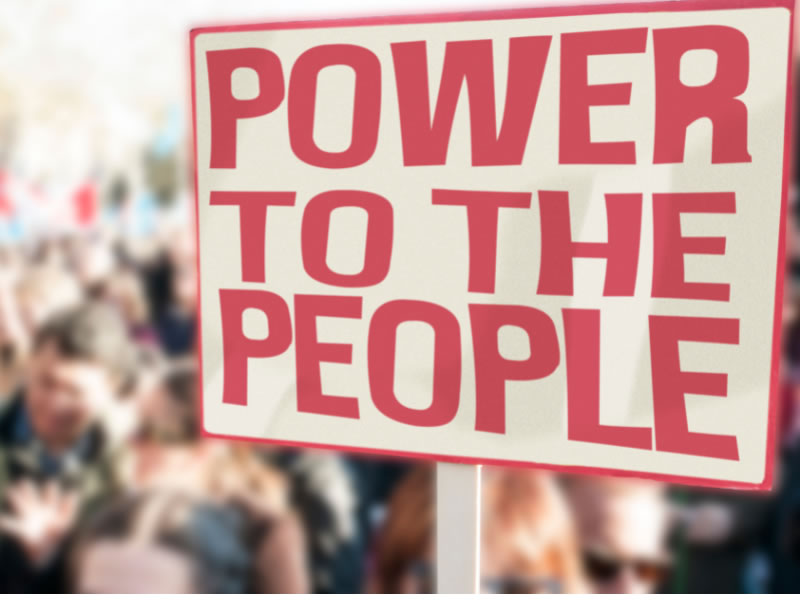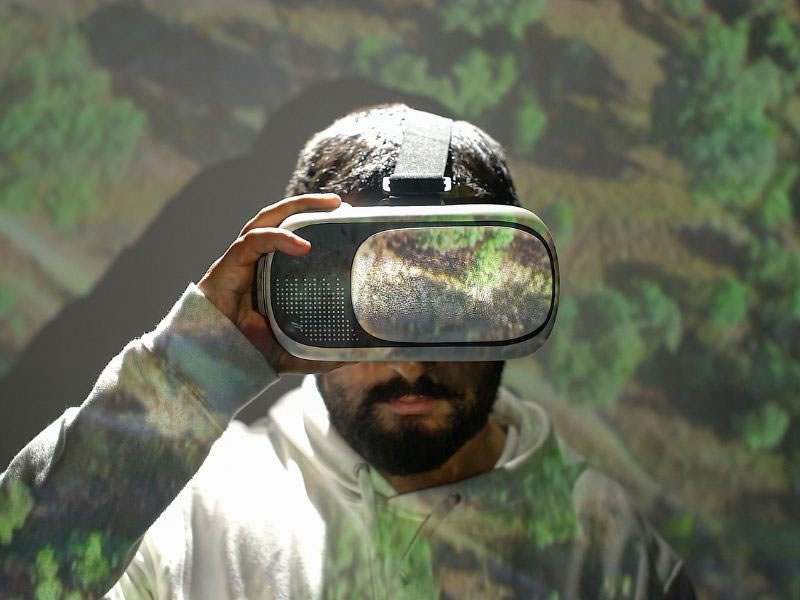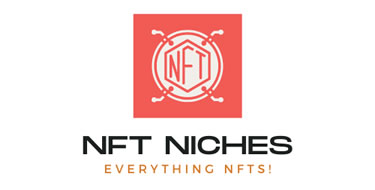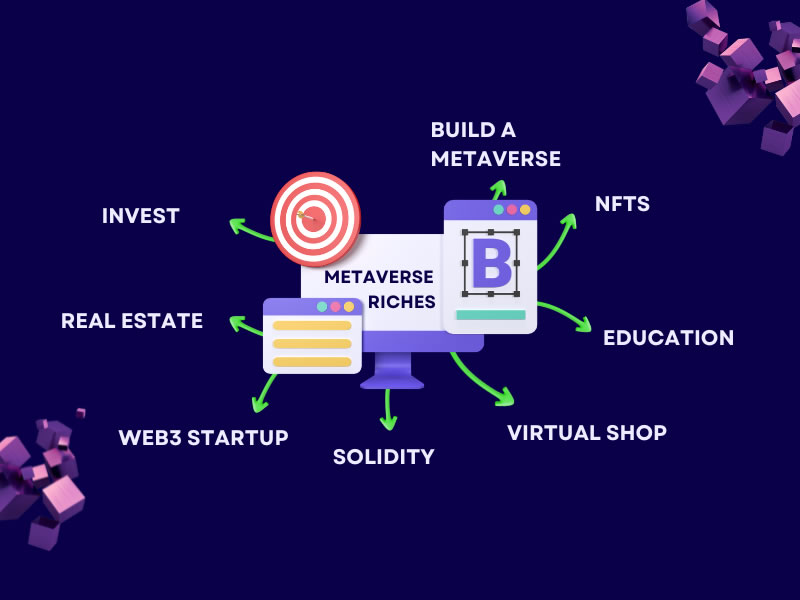The Metaverse, although portrayed as being the next version of the internet, has been incredibly hyped up.
Global brands spending millions of dollars researching the space, and even Facebook changed their name to Meta to show where their business and future is heading.
Have we peaked to soon with thoughts of the Metaverse?
Have investors, seeing the signs of the early dot com boom in the late 90’s and early 00’s seen fictitious patterns and pumped money into what is, inevitably, a failing industry?
The media’s attention in this incredibly early industry could, as some have predicted, overpriced digital land, real estate and assets which could only result in an imploding ghost town.
The Metaverse will fail.
Not all Metaverse’s will necessarily fail, but at least some Metaverse’s with millions, if not billions, of dollars pumped into the echo system will eventually fail.
If the Metaverse does succeed and we all live a virtual existence and life in the Metaverse it will likely to be in one dominant Metaverse, whilst the others turn in to empty streets full of For Sale signs.
We have spent a lot of time exploring the Metaverse industry and spent some time in the Metaverse ourselves.
In this article we look at the pros and cons of the Metaverse, our experience, how using historical events could draw conclusions to the overall fate of the Metaverse and our early predictions of which Metaverses are likely to succeed.
Is the Metaverse the Future
There are many promoters and supports across social media for cryptocurrency and NFTs, but you rarely find an influencer and promoter in the Metaverse space.
There are plenty of people on social media posting reviews and offering their verdicts on the Metaverse and their experiences, but aside from Mark Zuckerberg there are very few high-profile influencers pushing the Metaverse forward.
Why?
It could be the Metaverse is very early, and not quite the vision everyone currently expects.
In other articles we have drawn a conclusion between the everyday people’s expectations of the Metaverse as replicating the world Bruce Willis experiences in The Surrogates, where the experience resembles a game of 3D Mario!

Hype fueled by the media could be the end of the Metaverse before it begins.
On the other hand, this was the same view put forward by many as the internet first took shape. There were plenty of critics slating the internet as a fad that will disappear quicker than it arrived.
In the early days of the internet the online world was very different.
There were no huge brands or apps making things easier. No Amazon shopping, Facebook posting, Google searching, Instagram swiping or Uber ordering. The early adopters of the internet had dial up modems, an AOL portal, a lot of adult material and unregulated and unmonitored chat rooms.
Imagine how many investors would love to go back to those days and invest in a few start-ups of the time.
The Metaverse now is where the internet was when it started over 20 years ago.
Could the current incredibly low prices of MANA (Decentraland) and SAND (The Sandbox) look like a steal in just 5-10 years-time.
Trying to understand whether the Metaverse is the future is about understanding human psychology and behavior than it is technology.
The ‘If you build it, they will come’ mentality may not necessarily apply here, but if they do come so will the big brands, influencers and tsunami of uptake and users.
Do People Want a Decentralized Industry
The birth of the current Metaverses, like Decentraland and The Sandbox, were from the idea that businesses such as Meta (owning Facebook and Instagram), Tik Tok and Twitter should not hold the key to everyone’s data to do with what they choose.
This ideology has resulted in the creation of Web3.

Web3 turns away from big brand corporations and into a decentralized ecosystem where business decisions are made by votes of the users, not by a CEO or Founder.
This is also referred to as a DAO – a Decentralized Autonomous Organization.
Users, token holders and NFT holders having a stake and a vote. Those votes and the choices underneath the vote are locked in to a blockchain code.
Once the vote has passed, the decision is carried out. No counter arguments, delays, or sudden change of direction from the board.
If the users are making the decisions, surely then the Web3 business heads in the direction most beneficial to its users that make up the ecosystem and not rich shareholders, right?
Well, that is the intention.
The biggest up takers of this ideology are those who demand stricter privacy rules and laws around their data.
There are many people out there who take considerable distaste to how huge conglomerates manage our data, information and invade on our privacy.
Millions of social media posts talk about the subject in detail, sparking huge debates, which in itself is quite the irony.
For the Metaverse to be successful and not fail means it needs users, and millions of them.
The real statistic as to whether everyday people want to move towards a decentralized freedom ideology is whether people are leaving those very platforms the ideology is against.
It isn’t happening yet. Social media posts and the quest for more likes, status and wealth through advertising and affiliates is only on the increase.
Therefore although both Decentraland and The Sandbox, who have invested in to the Web3 ideology, were first and tipped to be the Metaverses most likely to succeed, it could be Meta under the watchful eye of Mark Zuckerberg that could use its current billions of user reach and dominate the space.
Then everyday people will complain about privacy issues on a Metaverse run by a corporation, rather than by its users.
Change for the better of the people is all well and good but it’s the people that will ultimately make that choice.
Stay for the convenience and excellent marketing spin or change the online world forever.
Why the Metaverse Could Fail
The Metaverse could fail if it struggles to attract the audience required to provide a thriving ecosystem.
A few thousand regular users wouldn’t be enough.
In order for the Metaverse to become the digital world the media portrays it could is to attract millions and millions of users.
To attract the type of audience size social media platforms such as Facebook, Instagram, Tik Tok and YouTube have achieved.
It took these companies years and years to reach the audience share.
The major benefit the social media platforms had was to build their ecosystem on an already existing internet.
The Metaverse, if launches successful, will require a different interface, different UI and people’s understanding of digital wallets, cryptocurrencies and NFTs.
This is an industry that will be years in the making, not months.
If wearing a VR headset to be a resident within the Metaverse for as long a period of time as people spend posting and scrolling through social media becomes a challenge, it could lead to an overall failure of the Metaverse.
If walking around streets as an avatar exploring digital buildings, meeting people, and buying digital trinkets is not how people want to spend their relaxation time, the Metaverse may struggle.
If people treat each other in the Metaverse as they can do on social media (such as the trollers and haters) it could start to become a place people don’t want to spend their time.
On the other hand, this could be where Metaverse tribes become a growing trend.
People could seek out communities from likeminded people with similar desires, goals, and ideologies and only people holding certain NFTs could become part of the group, and access certain buildings where such people hang out.
This already happens across social media, but instead of 2D avatar profile pics you will be a 3D avatar in a 3D world conversing in the same manner as a group of people would if they meet up.
It will be how the Metaverses keep out the trolls and haters and whether they start on the right foot by controlling the ecosystem to become a welcome environment.
Control is not generally considered as part of the freedom of the decentralized movement, and so powers of free speech could clash with keeping out the unwanted and building communities for those who want to positively contribute.
This is likely to be the deciding factor as to whether the Metaverse fails or succeeds.
Metaverse Alternatives
If the Metaverse does fail, but there is a market to use a virtual world and use virtual assets commodities where could they turn?
Second Life
One of the earliest versions of what could be described as a virtual world is called Second Life.
Second Life launched way back in the early days of the internet in 2003. This was slightly after the original dot com boom and bust, but still a lot earlier than the first iPhone in 2007.
The concept of Second Life was as the name suggests, it was to have a second life online through an avatar.
Second Life became very addictive for many, and some lived more than 50% of their lives online as an online persona. In cases even getting virtually married after forming a relationship with another Second Life user.
Second Life still exists but with a lot fewer community members. If there is a huge market ready to join an online world, we could perhaps see a resurgence of the Second Life ecosystem, especially considering the brand name is already there.
Playstation and Playstation VR
If we wanted to look elsewhere for a Metaverse alternative, it wouldn’t take too much research to stumble across Playstation and Playstation VR as a viable option.

Playstation consoles have been drawing gamers for over two decades now, from the humble beginnings of the original Playstation to the immersive gameplay and graphics now possible on the PS5, the technology is developing in a way that could support a Metaverse environment in years to come.
The Playstation VR is another amazing piece of technology that suits the direction the Metaverse is heading towards. Immersion.
Whether the Metaverse is going to fail or succeed there is an audience that has already started digitizing their life and their world online and in the cloud. More and more of our lives, contracts, and memories will be stored online.
It may not be long before we join our digital belongings in a virtual world.






